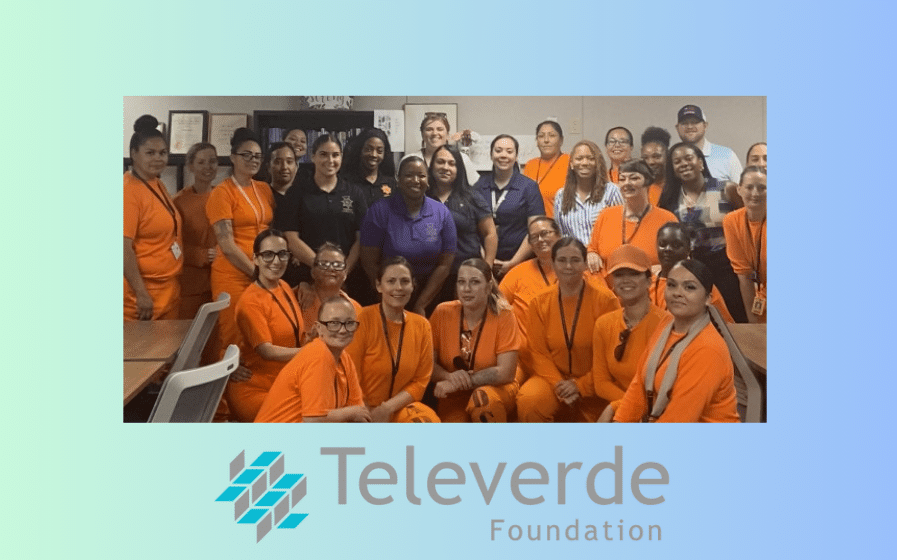Empowering the Justice Impacted: Transforming Lives and Communities
Written by Veronica Bravo

Share
Preparations were underway at the Televerde Foundation Perryville PATHS Center to welcome the Arizona Department of Corrections –Adult Probation Services Division. This collaboration aimed to listen and explore innovative methods to support currently and formerly incarcerated individuals, uniting a diverse group of people with the shared goal of combating recidivism.
The center was abuzz with anticipation on the day of the event as the students prepared for the 2024 Graduation of Cohorts 12 and 13. The names they chose for each group, The Ambitious Achievers & The Rising Warriors, reflected their determination and spirit. As the moment arrived, a steady stream of individuals entered the center, all in “regular” clothes, totaling 9 Parole Officers (POs) representing different districts. Their presence signaled a moment of curiosity from the ladies dressed in orange and the POs showed a genuine interest in engaging with the women of Televerde Foundation. Both sides were keen to learn about each other’s experiences and find ways to facilitate the women’s successful reintegration into society.
As we gathered in a conference room, there was a palpable sense of vulnerability and human compassion. For many justice-impacted women, it was the first time they had come face-to-face with the team that would become a crucial part of their lives post-release. Their courage in this moment, stepping into the unknown and facing their future head-on, was truly inspiring.
Many former inmates struggle to secure employment, find stable housing, and obtain access to mental health and substance abuse treatment. Considering that 60% of returning citizens face difficulties securing employment post-release, it is sobering. Parole officers often contend with overwhelming caseloads, making it difficult to provide individualized attention and support to each parolee, highlighting the need for improved reentry programs and comprehensive support networks to aid in the successful transition from prison to community. Enter Televerde Foundation.
The meeting commenced with an overview of the foundation, as two women dressed in orange gave a detailed presentation about the program and its remarkable success. Both women spoke confidently about the program’s impact. Since its inception, 755 women have graduated from the foundation’s PATHS (Prepare, Achieve, and Transform for Healthy Success) program, with 533 earning certificates and an impressive 96% securing employment upon release. Furthermore, there has been a remarkable 98% increase in salaries and 0% recidivism among program participants. The positive impact extends beyond the women to their children, with over 780 kids benefiting from the opportunity to reunite with their mothers post-release. The presenters beamed with pride as they spoke about the program, a testament to the personal growth and empowerment it had fostered in them.
Prison programs offered by non-profits like Televerde Foundation aim to help women while they are incarcerated to break the cycle of poverty and recidivism. Their solutions to success include a four-phased approach to successful reentry: Career PATHS, PATHS Reentry, PATHS 2 Success, and PATHS 2 Professionalism. Career PATHS is a six-month workforce development program that helps the currently incarcerated gain skillsets in customer service, inside sales, project management, digital marketing, and computer technology. For most, it is the first time they learn about the business fundamentals and communication skills necessary to adapt to the workforce upon release.
PATHS Reentry is a six-month pre-release program focusing on self-development and workplace preparation training. It is critical for participants to gain the skillsets needed to join today’s workforce. Equally important is providing them with the skills to learn about emotional intelligence, healthy relationships, responsible thinking, teamwork, and collaboration. As the participants re-enter their communities, Televerde Foundation also ensures they are supported post-release. Graduates are provided 30 days of personal care products, transportation vouchers, interview readiness kits, access to community resources, and job placement opportunities.
Following the presentation, we all moved into a conference room. It was here where two different worlds connected as one. As the women in orange talked about their stories of resilience, hope and transformation, it brought many POs to tears. One remark particularly moved me, “This showed us that you are human too and we are in this together.” At this moment, it became clear that people in prisons are not just inmates, but human beings. If determined enough to do it, they will strive to create a better life when given the opportunity and resources. These roundtable discussions are crucial in bridging the gap between different perspectives, fostering mutual understanding and driving tangible change. Humanizing the issues at hand is key to combating recidivism, as evidenced by the alarming rates of re-incarceration for individuals after their release.
Parole officers play a crucial role in supervising and supporting individuals released from prison to ensure their successful reintegration into society while prioritizing public safety. However, one of the biggest challenges they face is the lack of resources and support systems available to individuals reentering society after incarceration. The impact of rehabilitative and post-release programs like those offered through Televerde Foundation is a powerful force for positive change. Understanding each perspective and working together toward a common goal can bring about the meaningful change we aspire to see. Whether you’re an employee volunteering with a program like the Televerde Foundation or a Parole Officer playing a supportive role in post release, joining forces in this effort can lead to remarkable outcomes.
